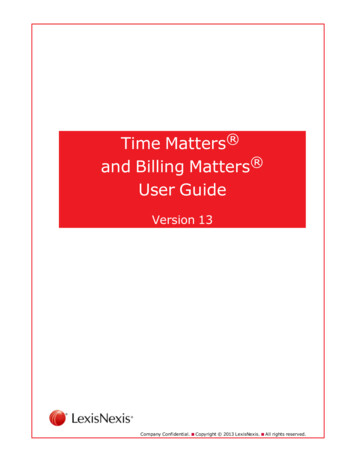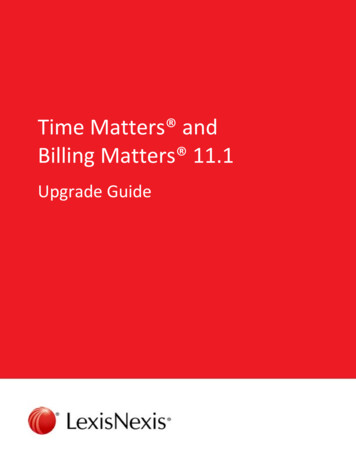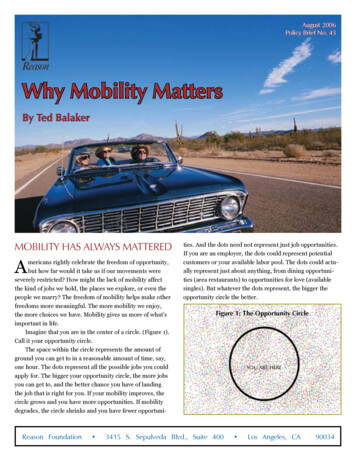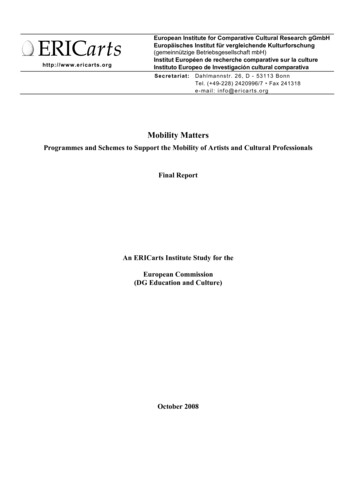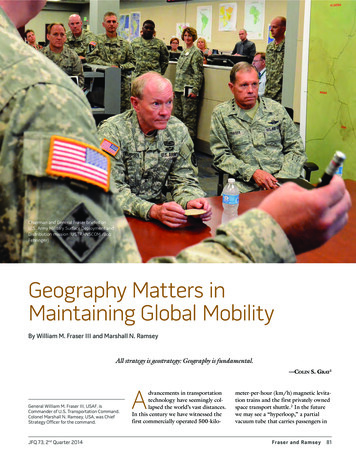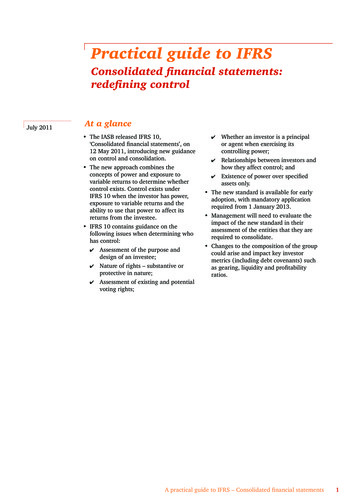
Transcription
www.pwc.co.ukMobility mattersThe essential UKtax guide forindividuals oninternationalassignmentabroadDecember 2017
Contents1Determining your UK tax liability1.1What impact will my overseas assignment have on my UK tax position?1.2How do I become non-resident for UK tax purposes?1.3How do I calculate whether I am averaging a 35 hours working weekoverseas?1.4How do I work out how many workdays and days I can spend in the UKand still split the tax year?1.5How do I count a day spent in the UK and a UK workday?1.6What records do I need to prove I am working full time overseas?1.7What if I do not meet these conditions?1.8What happens if I do not become non-resident?1.9Are any tax reliefs available for a tax resident on a short term assignment?1.10How is my spouse or civil partner affected by my overseas assignment?1.11Does it matter if I am domiciled outside the UK?2The taxation of non-residents2.1What are the main implications of becoming non-resident in the UK fortax purposes?2.2Am I still entitled to personal tax allowances?2.3Can I continue to participate in an Individual Savings Account (ISA)?2.4Is my other personal income taxable during my assignment?2.5Are there significant advantages in moving my personal investmentsoutside the UK?2.6What are the implications if I make capital gains while non-resident?2.7Are there any tax implications for my other personal income?2.8How will my stock options be treated?2.9Non-tax qualifying stock option plans2.10Tax qualifying stock option plans2.11Will any other stock-based income I receive from my employment be taxedin the same way?2.12Can I continue to participate in a UK personal pension plan or astakeholder pension plan?2.132.14Does it matter if I am non resident for five or fewer years?During my time in the UK I claimed the remittance basis of taxation. Can Ibring this remittance basis income into the UK after leave?2.15 How are my Student Loan repayments affected by my overseas assignment?2The essential UK tax guide for individuals on international assignment abroad610
3Renting and selling your home3.1What happens if remain UK resident and I sell my home?3.2What happens if become non-UK resident and I sell my home?3.3What if I rent out my home during my assignment?3.4Why is my rental agent deducting tax from rental income?4Tax administration4.1If I am non-resident do I need to file a tax return?4.3What should I do if I need to file a tax return but haven’t received one?4.4By when must I submit my UK tax return and pay tax?5Social security contributions and benefits5.1Will I continue to have to pay National Insurance contributions?5.2Transfers to European Economic Area (EEA) countries5.3Transfers to countries where the UK has a social security agreementShould I make voluntary contributions?5.6Can I continue to claim UK child benefit while I am overseas?5.7Am I covered for healthcare?6Work permits6.1Do I need a work permit?6.2Do I need any documents to work in the EEA?6.3What if I do need a work permit?6.4How long does it take to obtain a work permit?6.5What about my family?Miscellaneous7.1Will I pay tax in the assignment country?7.2Do I need to make or review my will?7.3What if I am proposing to make substantial gifts out of my assets?7.4What about when I return to the UK?820Transfers to countries where the UK does not have a socialsecurity agreement5.5718What forms do I need to send to HM Revenue and Customs when I goon assignment?4.25.416Appendices222325Appendix I: Double taxation agreement countriesAppendix II: Social security agreement countriesAppendix III: ResidenceAppendix IV: Applying the split year rules9ContactsThe essential UK tax guide for individuals on international assignment abroad363
4The essential UK tax guide for individuals on international assignment abroad
Welcome to the essential taxguide for individuals goingon international assignmentabroadIt can be daunting going to work in aforeign country on an internationalassignment. Understanding how taxand social security are affected bymaking such a move can add to thelist of complexities you have to dealwith.Victoria RobinsonUK markets leader, PwC GlobalMobility ServicesOur Global Mobility Services team atPwC has been advising UK nationalson overseas assignment for over 25years, helping thousands ofinternational assignees understandwhat they need to do.The purpose of this guide is to shareour experience with you, in the formof some frequently asked questionsand answers, to help you when youmake your international move.The advice contained in thisdocument reflects UK tax law and thereporting position for the 2016/17 taxyear starting on 6 April 2016 (unlessindicated otherwise). As you will beaware, in 2016 the UK voted to leavethe EU and in March 2017 the UK’sPrime Minister triggered “Article 50”to commence the formal exitnegotiations. As a result, the UK isdue to exit the EU in March 2019.Although triggering Article 50 did notof itself bring about any changes inUK law, the UK’s formal exit from theEU may bring about significantchange in a number of areas forassignees, particularly in relation toimmigration requirements and socialsecurity.Please do ask for advice before you acton any of the information containedin this guide to make sure you havethe most current data. PwC is part ofa network of firms, with offices inover 154 countries. Our advice spansall jurisdictions, so if you would liketo find out more please contact me oryour usual PwC adviser – details ofhow to do so are listed on the contactspage.You can also find further informationon UK tax rates, allowances andBudget news at www.pwc.co.uk.We hope you find this guide usefuland informative.This guide does not cover the tax andsocial security implications ofself-employed individuals orpartnerships, for which there aredifferent rules.The essential UK tax guide for individuals on international assignment abroad5
1. Determining your UK taxliabilityUnder UK law, spouses and civil partners are generally treatedentirely separately for tax purposes. This means that the taxresidence position of your spouse or civil partner needs to beconsidered based on his or her own facts and circumstances. Insome cases it can be influenced by your own tax residence position.1.1 What impact will myoverseas assignment haveon my UK tax position?This depends upon the length andtiming of your assignment, any returnvisits you make to the UK and whatpersonal ties you maintain with theUK during your assignment. Thesefactors will determine whether youare considered resident ornon-resident for tax purposes in theUK during your assignment. Thetaxation of residents andnon-residents is very different.1.2 How do I becomenon-resident for UK taxpurposes?Your residence position is determinedby a statutory residence test (pleasesee Appendix III). Many people willbe regarded as UK resident during thetax year that they leave the UK. Incertain situations it is possible to splitthis tax year into a UK part and anoverseas part. If you are able to dothis you will be taxed as if you werenon-resident for the overseas part ofthe tax year.Most assignees will be able to split theyear from the point they leave the UKto start working full time overseas(see Appendix IV for greater detailand the other ways to split a tax year).You need to make sure you can meetthe following conditions to beconfident you can split the tax year:6The essential UK tax guide for individuals on international assignment abroad You are leaving to work full timeoverseas for the rest of the taxyear and the next full tax year(from 6 April to the following5 April) and; There are no significant breaks inyour employment. A break ofmore than 30 days is significant(subject to exceptions for certainannual, parenting and sick leave)and; You average at least a 35 hourworking week overseas over therest of the tax year and; You have physically left the UKto begin your employment abroadand not, for example, for aholiday before starting theemployment and; Visits to the UK during youroverseas assignment do notexceed 90 days spent in the UKand 30 workdays back in the UK.These need to be pro-rated basedon when you leave the UK (seesection 1.4 below).If you do not met all these conditionsyou may be able to split the tax yearbut you will need to take specialistadvice to ascertain if this is possible.1.3 How do I calculate whether Iam averaging a 35 hourworking week overseas?The calculation is extremely complexand needs to be undertaken using aformula provided in legislation.Please seek professional advice inorder to complete this calculation.
1.4 How do I work out howmany workdays and days Ican spend in the UK and stillsplit the tax year?1.8 What happens if I do notbecome non-resident?In your year of departure you mustpro-rate the 30 workday and 90 daylimits based on when you leave theUK. The proration can be complexand you should seek professionaladvice to help you find out theprorated number.1.5 How do I count a day spentin the UK and a UKworkday?A day is spent in the UK if you arehere at midnight. A day of workincludes any type of work, includingtravel for work purposes, that lasts formore than 3 hours in the UK.1.6 What records do I need toprove I am working fulltime overseas?We recommend that records are keptthat evidence the time you spendworking overseas. Email calendars,timesheets and detailed work diarieswill all prove useful when supportingthe claim that you were working fulltime overseas. You should also keepcontracts of employment and otherdocumentation/communicationswhich relate to your time overseas.HMRC has been known to ask forinformation on the nature andduration of work activities andtherefore you may wish to take aconservative approach and ensureyour records of working time aresufficiently detailed, should HMRCever enquire into your residenceposition.If your overseas assignment does notresult in you being treated as non-resident, you will normally continueto be subject to UK tax on worldwideincome. A UK tax liability will ariseon many of your assignment-relatedpayments, even if these are paid inthe assignment location, such ashousing and cost of living allowances.In some cases special tax reliefs areavailable for assignment-relatedpayments. These are covered inquestion 1.9 below. Your UKemployer will be required to continueoperating Pay As You Earn (PAYE).Since there may also be tax to pay inyour assignment location, this maylead to double taxation or more likelyto cash-flow implications. If you paytax in your assignment location youshould be able to claim credit for thetax paid when calculating your UK taxliability (subject to limitations). TheUK has an extensive network ofdouble tax treaties with othercountries. One of the functions ofthese treaties is to prevent doubletaxation by allowing only one countryto tax your earnings. However, thisprovision does not always apply. Forinstance, it does not apply if you areworking in another country for morethan six months. In this case you maybe taxed both in the UK and in yourassignment location and credit shouldbe given in the UK for the tax paid inyour assignment location.1.7 What if I do not meet theseconditions?If there is any doubt about whetheryou will meet these conditions, andyou also continue to maintain links tothe UK (for example your family isremaining in the UK while you are onassignment) your residency positionwill be more complex and you shouldtake professional advice on it asnecessary.The essential UK tax guide for individuals on international assignment abroad7
1.9 Are any tax reliefs availablefor a tax resident on ashort-term assignment?continuing employment and thelength of your assignment may beavailable, including:1.10 How is my spouse or civilpartner affected by myoverseas assignment?If your assignment is not expected tolast more than two years and is part ofa continuing employment you maynot be subject to UK tax onemployer-provided accommodation,travel and subsistence relating to yourassignment. If you are personallyincurring these costs you may also beable to claim a deduction for suchcosts. Strictly, in all cases, this willonly apply to your personal costs anddoes not apply to costs which aredeemed to relate to your spouse orcivil partner and children. Other taxreliefs which do not depend on Employer reimbursement of yourpersonal additional travel andsubsistence costs of workingoverseas. This includes the cost oftravel between the UK and theassignment location where theduties are being performed. For all but very short assignments(under 60 days) the reimbursedcost of your family visiting you. Overseas board and lodging costsbut only where you take up aseparate overseas employment.Under UK law, spouses and civilpartners are generally treated entirelyseparately for tax purposes. Thismeans that the tax residence positionof your spouse or civil partner needsto be considered based on his or herown facts and circumstances. In somecases it can be influenced by your owntax residence position. For instance, itis probable that your spouse or civilpartner will remain tax resident, evenif you are considered non-resident, ifhe or she does not accompany you onyour overseas assignment. However ifyou are considered non-resident andyour non-working spouse or civilpartner accompanies you on yourassignment then he or she willgenerally (although not in all cases)be treated as having broken taxresidence at the date of departure,even though he or she is not infull-time employment outside the UK.8The essential UK tax guide for individuals on international assignment abroad
Key considerations1.11 Does it matter if I amdomiciled outside the UK?Review the split of assets and income with yourspouse or civil partner and consider changes toensure that both your personal tax allowances arebeing fully utilised.The position for someone who is notdomiciled in the UK is likely to bemore complex as there are additionalrules that can apply to foreigndomiciliaries. For example, offshoreinvestment income, if remitted to theUK while you are regarded astemporarily non-resident, willpotentially be taxable. Werecommend you take further UK taxadvice if you are domiciled outsidethe UK.The essential UK tax guide for individuals on international assignment abroad9
2. The taxation of non-residentsEach source of personal income needs to beconsidered to establish your optimum UK taxposition. Some sources of investment incomecan effectively be received tax free or at areduced tax rate when you are non-resident. 2.1 What are the mainimplications of becomingnon-resident in the UK fortax purposes?Becoming non-resident will generallymean that you only remain liable toUK tax on UK source income. Thisapplies from the day you meet theconditions to be taxed as non-residentto the day you cease to meet thoseconditions. Normally, provided thatany employment duties youperform in the UK are onlyincidental to your main duties,you will not have to pay UK tax onemployment income and benefitsearned after you have broken UK taxresidence. This applies even if you arestill paid from the UK.Your UK tax liability on incomearising when you are considerednon-resident is normally restricted to: Earnings from an employmentpreviously carried on whileresident in the UK, even if they arereceived after you have left the UK.A typical example is a bonus paidafter you leave the UK which wasearned before you left. Please notethat depending on the PAYEcoding that is in place for you, youremployer may not be able todeduct any tax at source. Evenwhere he can do so any deductionmade may not represent your finalliability.10 The essential UK tax guide for individuals on international assignment abroad Some payments received onthe cessation of youremployment wheretermination occurs duringyour overseas assignment.Stock options exercisedduring your assignment thatmay have been earned byreference to UK service – thisis covered in more detail insection 2.7.Other awards of shares thatmay have been earned byreference to UK service.Tax on UK source personalincome, such as interest onUK bank accounts, UKdividends and rental incomefrom UK properties.Capital gains tax (CGT) whicharises on the sale of someassets. In particular, if youare temporarily non-residentfor CGT purposes (broadly, ifyou are non-UK resident forfive years or less) any gainsrealised during the absenceon assets held before you leftthe UK are likely to becharged to tax in the year ofyour return (see section 2.6below). Whether you areliable is entirely dependenton your personalcircumstances and werecommend you take furtheradvice if you are in thisposition. Please also seesection 2.7 regardingnon-resident CGT ondisposals of residentialproperty.
This will depend on the level ofinvestment income you receive fromeach source. Generally, the mainsources of personal income are taxedas follows:UK interest: Prior to 6 April 2016,tax was in principle deductible atsource on UK bank and buildingsociety interest, although nonresidents could elect to receive theinterest on a gross basis. However,deduction at source for interest wasabolished from 6 April 2016 and anew “personal savings allowance” wasintroduced. This means that some orall of your bank and building societyinterest may be tax free, dependingon the amount of interest payable andthe level of your other sources ofincome. Please contact us for furtherdetails.2.2 Am I still entitled topersonal tax allowances?Yes, if you are a UK, or EuropeanEconomic Area (EEA) national(Appendix II) or a resident of certaincountries with which the UK has adouble tax treaty (Appendix I). This isprovided that your taxable incomedoes not exceed a prescribed level,currently set at 100,000, after whicha phase out applies. Where personaltax allowances are granted under atax treaty, they may not be available ifthe only UK income you are receivingis interest or dividends. Please seesection 2.4 below for further details.2.3 Can I continue to participatein an Individual SavingsAccount (ISA)?ISAs are available to individuals whoare resident in the UK for taxpurposes and over18 years old. If you becomenon-resident you may retain existingISA investments, with the UK taxadvantages, but you may not investin ISAs when you are considerednon-resident. Income from an ISAmay be subject to tax in yourassignment location.2.4 Is my other personal incometaxable duringmy assignment?UK dividends: Prior to 6 April2016, tax on dividends was collectedat source in the form of a notional taxcredit relating to the cash dividendreceived. However, the dividend taxcredit was abolished from 6 April2016 and a new dividend taxallowance of 5,000 per year wasintroduced. Dividend income inexcess of the allowance is taxable. (Asfrom 6 April 2018 the dividend taxallowance is to be reduced to 2,000per year). Please contact us forfurther details.Rental income: Any profit whicharises from renting UK property willcontinue to be taxable in the UK. Wecover this in more detail in section 3.In a complete UK tax year of nonresidence, a restriction operates tolimit your liability to UK income tax.Your tax liability is the lesser of:In the year of departure from the UK, UK tax (if any) deducted at sourceyour personal tax allowances willfrom certain investment income,normally be fully utilised againstEach source of personal income needsplus your UK tax liability on anyearnings arising in the pre-departureto be considered to establish your UKother UK source income calculatedperiod which remain fully taxable.tax position. This is an area wherewithout any claim to tax-freeHowever, because of the way in which advice on your own personalpersonal allowances.relief for these personal taxcircumstances is critical to achieve theallowances is given, if all of your tax is most efficient tax result.collected through the PAYE systemand you have no benefits-in-kind orother taxable income, you wouldnormally find that a small refund maybe due for the year of your departurebecause
Mobility matters www.pwc.co.uk The essential UK tax guide for ind
